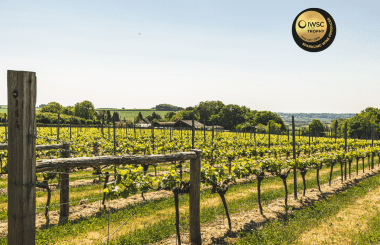IWSC Judges heading to China: "We can't wait to meet Chinese wine producers!"
In August, the IWSC will be holding the first Global Wine Judging in China, held in partnership with the Xinjiang Tianshan Mountains North region. Our panel of international and local industry experts will be tasked with tasting and rating wines from across the country. In addition, our team of judges will be visiting the local wine producers delving into the Chinese wine culture. Ahead of the event, we sat down with three of our international judges to hear their expectations of the upcoming judging and their thoughts on the quality of Chinese wines. Read on to find out what the IWSC Judging Committee member Susie Barrie MW, and judges Antony Moss MW and Isa Bal MS had to say.
Susie Barrie MW:
I can’t deny that being asked to oversee the judging panels for this first year of the IWSC in China is quite a responsibility, and definitely not a role I take lightly. I’ve chaired plenty of wine competitions in my time and this is an incredible opportunity that I’d have been mad to turn down. That said, I’m also aware that China’s dedicated producers are putting their trust in us, and it’s our job to make sure each and every wine is judged rigorously and fairly.
One thing I’m particularly looking forward to is the chance to blind taste a wide range of Chinese wines with fellow experts. From my experience, I’ve tried Chinese wines that are elegant, others that are expressive, but what I’m also going to be looking for are wines with a real sense of character, identity and ambition across regions. The kind of wines that get people excited and motivated to explore. So I’m going to China with a completely open mind!
Antony Moss MW:
I have a positive opinion of Chinese wines, and fairly high expectations based especially on the red wines I have tasted in recent years. But I am also aware this is a country where the diverse space of wine styles remains to be fully explored (by consumers, as well as producers). The ever increasing expertise (and investment) surely helps.
Regarding the competition, I expect the usual IWSC rigour and integrity of the process. The wines themselves - it all depends on who enters their wines (which, tasting blind, we cannot know). The last time I tasted a large quantity of Chinese wines blind was nearly a decade ago, when the overall standard was good, especially from Ningxia, though many wines back then could have been improved with dialling back oak and being a little less heavy in tannins. There was one hauntingly beautiful ice wine that was a delightful find. I am particularly interested to see trends in red wine styles, something you only really see when you try a lot of wines side by side.
Isa Bal MS:
I try to go to tastings with no expectations and focus on what I am tasting. From my previous experiences of tasting Chinese wines there seems to be a large range of styles and quality. I do see an increase of quality with each year though.
Susie Barrie MW:
Having never visited China I’m genuinely looking forward to every single bit of it. Experiencing a new country is always exciting and when it’s somewhere as huge and influential as China, even more so. I know the judging is going to be fascinating, but I also can’t wait to get out to the wineries and meet the people actually making the stuff. Let’s just hope their English is better than my Chinese…
Antony Moss MW:
The judging will be interesting, including the discussions with the other judges to reach our conclusions. But I am very much looking forward to having the chance to visit wineries and see local production, especially seeing how vines are grown in such climatically challenging conditions. I am very interested to see the extent to which sustainability practices are being considered, or have been adopted. This is a big topic in the global industry, and I think the role vineyard land can play in carbon sequestration (and resulting soil improvement) could be of especial relevance, but such arid conditions seem very challenging to the more common regenerative practices. I have much to ask!
Isa Bal MS:
I am really excited to see the region where wine is actually made. I think being in the region really helps one to understand the wines from there.
What will you be looking for in a medal-winning wine from China?
Susie Barrie MW:
Exactly the same thing that I look for in any medal-winning wine, no matter where in the world it comes from - drinkability. Whatever the style, colour or ageability of a wine, it needs to be balanced and refreshing to be truly great. Added to that, character and typicity is hugely important too. I want to drink wines that have something to say for themselves, wines that surprise and delight as well as impress - and I’ve no doubt we’ll be judging plenty of those in this competition.
Antony Moss MW:
The best thing an international competition can do is judge wines against international standards, which can be very unforgiving. Consequently, winning an IWSC medal is an industry-recognised proof of exceptional quality. And if you don’t win a medal, the feedback you will get from the judges is invaluable and can be instrumental for the future success of your wines in the global market.
Of course, local stylistic typicality can be taken into account, but other quality criteria such as technical competence of winemaking (not just freedom from faults, but aspects such as sensitive use of oak and careful tannin management), expressiveness and complexity, overall balance and capability of providing pleasure are more universal. I will be looking for all of these.
Isa Bal MS:
As in wines from every other region I taste, I will be looking for the style of wine that reflects the varietal character and shows a sensitive approach to winemaking. Overall balance and fruit quality is also high on my list.
Why do you think it will be beneficial for Chinese producers to enter the IWSC Wine Judging in China?
Susie Barrie MW:
As we all know, for any winemaking country to compete on the world stage it’s essential that its wines are tasted and rated by experts with a global perspective. There’s also nothing quite like wines being tasted in their country of origin. With the IWSC sending a panel of international judges out to China to judge alongside local experts, producers are getting the best possible endorsement for their wines, and the subsequent international promotion of award-winners will be invaluable.
Antony Moss MW:
Len Evans used to say that the purpose of competitions is 'to improve the breed'. I think this is an important aspect i.e. to identify the best so these can act as benchmarks against which others can aspiringly measure themselves. Wineries that do less well should taste the winning wines and consider how they might improve, which should include some critical thinking rather than simply copying (otherwise everything ends up tasting the same and there are too many followers and too few leaders). Or, the less successful wineries may reach a conclusion that they still prefer to make the wine their way, but gain some insight into why their (maverick!) wines may struggle to find wider audiences. They can think about how to communicate the unique features that they would rather retain than 'improve'. Meanwhile, winning wines gain time in the spotlight, and benefit from their profile being raised to customers. Competitions like this are especially valuable to buyers in international markets seeking to find a shortlist of wines to purchase.
Isa Bal MS:
It will show what international markets are looking for in wine, establish a link between Chinese wines and the rest of the industry in the world.
The IWSC Wine Judging in China, in partnership with the Xinjiang Tianshan Mountains North region, will take place on 26 – 28 August 2024. The entry deadline is 22 July 2024. Find out more here.



